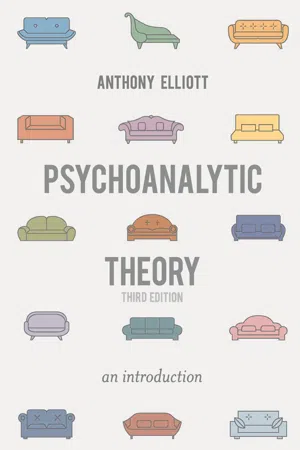
- 216 pages
- English
- PDF
- Available on iOS & Android
About this book
Influential, exciting and often controversial, psychoanalytic theory has had a major impact in the humanities and social sciences. In a new edition of this classic book, Anthony Elliott masterfully introduces the reader to psychoanalytic theory. - Discusses leading psychoanalytic theorists - from Freud to Lacan, Klein to Kristeva, Žižek to Laplanche;
- Examines the political and cultural dimensions of psychoanalytic studies, from feminism to postmodernism; and
- Contains new material on Lacanian and post-Lacanian theory, the post-Kleinian psychoanalyst Wilfred Bion, psychoanalytic feminism and deconstructive psychoanalysis. Written by one of the world's leading social theorists, this engaging and influential text is essential reading for anyone wanting to learn about psychoanalytic theory and its cultural importance in our lives. New to this Edition:
- New and fully revised edition with new material on theories
Tools to learn more effectively

Saving Books

Keyword Search

Annotating Text

Listen to it instead
Information

Table of contents
Frequently asked questions
- Essential is ideal for learners and professionals who enjoy exploring a wide range of subjects. Access the Essential Library with 800,000+ trusted titles and best-sellers across business, personal growth, and the humanities. Includes unlimited reading time and Standard Read Aloud voice.
- Complete: Perfect for advanced learners and researchers needing full, unrestricted access. Unlock 1.4M+ books across hundreds of subjects, including academic and specialized titles. The Complete Plan also includes advanced features like Premium Read Aloud and Research Assistant.
Please note we cannot support devices running on iOS 13 and Android 7 or earlier. Learn more about using the app